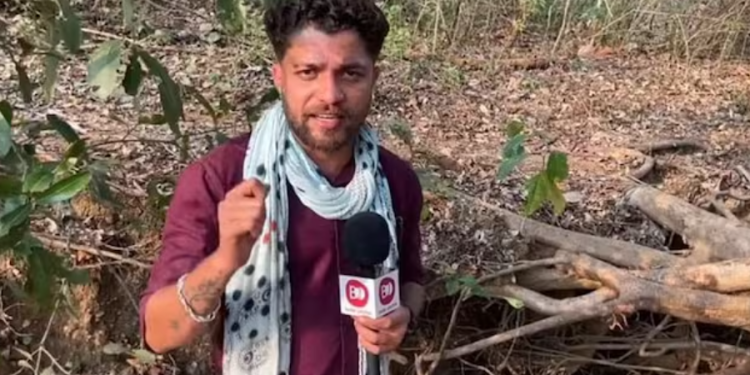By Sanjay Parate
If journalism is the mother of democracy and journalists form the fourth pillar of the democratic edifice, then on the night of January 3, this pillar was metaphorically buried in a septic tank in Bijapur, Bastar. The tragic death of journalist Mukesh Chandrakar symbolizes the systemic decay and brutality inflicted on democracy by forces of crony capitalism, political complicity, and corruption.
The story of Mukesh Chandrakar is not just the tale of a journalist who paid the ultimate price for his courage. It is a chilling narrative that reveals why India continues to be labeled a “flawed democracy” by global observers. On a night when the world welcomed a new year with hope, the demons of Bastar silenced a voice that dared to expose their wrongdoings.
A Journalist Who Stood for Truth
Mukesh Chandrakar’s journalism was fearless, rooted in the struggles of the marginalized tribal communities of Bastar. Through his work, he consistently exposed corruption, exploitation, and human rights violations. Yet, his efforts earned him enemies in the corridors of power and among those who benefitted from the exploitation of Bastar’s resources. Tragically, these forces conspired to end his life, burying not just a journalist but the essence of democracy itself.
The primary accused in Mukesh’s murder is Suresh Chandrakar, a state-backed contractor with deep political connections. Suresh represents a localized version of crony capitalism that has entrenched itself in Bastar. Just as national-level capitalism has created figures like Adani and Ambani, local-level cronyism has empowered individuals like Suresh, who exploit resources with impunity while trampling on the rights of the indigenous population.
Crony Capitalism and Salwa Judum’s Legacy
The murder of Mukesh Chandrakar cannot be separated from the violent legacy of Salwa Judum, a state-sponsored militia ostensibly created to counter Naxal insurgency but widely criticized for human rights abuses. Figures like Suresh Chandrakar were products of this initiative, legitimizing the illegal acts of looting and violence. These elements, nurtured by political parties and the corporate sector, have now transformed into a mafia that operates with complete impunity in Bastar.
This crony capitalist system operates through a nexus of politicians, contractors, and bureaucrats. In Bastar, vast sums have been spent on so-called development projects, often benefiting only those in power. The construction of a road from Gangaloor to Mirtur exemplifies this corruption. The contract for this road, initially budgeted at ₹56 crores, ballooned to ₹120 crores, with the funds allegedly siphoned off by contractors like Suresh. Meanwhile, the road itself, built with substandard materials, was washed away in the first rain.
The Role of Political Parties
Both the Congress and BJP are complicit in perpetuating this system of exploitation. The thin line separating these two parties in Bastar has long disappeared, with figures like Mahendra Karma (Congress) and Brijmohan Agarwal (BJP) collaborating openly during the era of Salwa Judum. Today, these parties continue to shield the mafia responsible for looting Bastar’s resources and silencing dissenting voices.
Mukesh’s death exposes the duplicity of these political actors. While both parties blame each other for the murder, their allegations are nothing more than a smokescreen. The truth is that the mafia operating in Bastar enjoys protection from both sides of the political aisle.
A Decaying Democratic Fabric
Mukesh Chandrakar’s murder is a stark reminder of the erosion of democracy in India. The systemic failure to protect journalists, the complicity of law enforcement, and the dominance of corporate interests over public welfare have collectively contributed to this decline. The reluctance of the Bijapur police to investigate Mukesh’s disappearance and the subsequent discovery of his body in a septic tank reflect the extent to which the state machinery has been compromised.
Even the formation of a Special Investigation Team (SIT) to probe Mukesh’s murder appears to be a token gesture designed to deflect criticism. Past experiences with SITs, such as in the case of lynchings by cow vigilantes, suggest that such investigations rarely deliver justice. Instead, they often serve to protect the powerful while erasing the voices of the oppressed.
Journalism Under Siege
Mukesh’s murder is part of a broader pattern of increasing violence against journalists in India. According to the Committee to Protect Journalists, India ranks among the most dangerous countries for journalists. Between 2005 and 2024, at least 28 journalists have been killed in the country, with the majority of these cases involving perpetrators who have faced no consequences.
This climate of fear has only intensified in recent years. Reports indicate that between May 2019 and August 2021, there were 256 attacks on journalists, averaging one every three days. The murder of Mukesh in 2025 marks another grim milestone in this ongoing assault on press freedom.
Mukesh’s Legacy
Mukesh Chandrakar was more than just a journalist; he was a voice for Bastar’s marginalized communities. His reporting highlighted the struggles, hopes, and aspirations of the tribal population, offering a rare glimpse into their lives. He was a bridge between the administration and the tribals, a role that required immense courage and dedication.
Mukesh’s murder is a loss not just for his family and colleagues but for democracy itself. His death underscores the urgent need for systemic reforms to protect journalists and ensure accountability for crimes against them.
To honor Mukesh’s legacy, it is imperative to demand a thorough, impartial investigation into his murder. This investigation must go beyond identifying the immediate perpetrators and address the systemic issues that enabled this crime. The nexus of political power, corporate interests, and law enforcement must be dismantled to restore faith in democracy.
At a broader level, there is an urgent need to enact stronger protections for journalists in India. Both the Congress and BJP, despite their rhetoric, have failed to create an environment where journalists can work without fear. A free and independent press is essential for any democracy, and without it, India risks sliding further into authoritarianism.
Mukesh Chandrakar’s life and work serve as a testament to the power of journalism to challenge injustice. His death, however, is a grim reminder of the cost of speaking truth to power in a system that prioritizes profits over people. As we mourn his loss, let us also renew our commitment to the values he stood for — truth, justice, and democracy.






